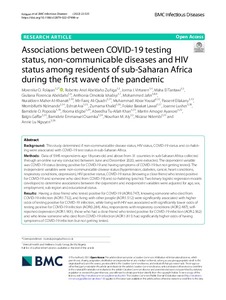Associations between COVID-19 testing status, non-communicable diseases and HIV status among residents of sub-Saharan Africa during the first wave of the pandemic
Folayan Morenike O.; Abeldaño Zuñiga Roberto Ariel; Virtanen Jorma I.; El Tantawi Maha; Abeldaño Giuliana Florencia; Ishabiyi Anthonia Omotola; Jafer Mohammed; Al-Khanati Nuraldeen Maher; Quadri Mir Faeq Ali; Yousaf Muhammad Abrar; Ellakany Passent; Nzimande Ntombifuthi; Ara Eshrat; Khalid Zumama; Lawal Folake Barakat; Lusher Joanne; Popoola Bamidele O.; Idigbe Ifeoma; Khan Abeedha Tu-Allah; Ayanore Martin Amogre; Gaffar Balgis; Osamika Bamidele Emmanuel; Aly Nourhan M.; Ndembi Nicaise; Nguyen Annie Lu
https://urn.fi/URN:NBN:fi-fe2022081154011
Tiivistelmä
Background: This study determined if non-communicable disease status, HIV status, COVID-19 status and co-habiting were associated with COVID-19 test status in sub-Saharan Africa.
Methods: Data of 5945 respondents age 18-years-old and above from 31 countries in sub-Saharan Africa collected through an online survey conducted between June and December 2020, were extracted. The dependent variable was COVID-19 status (testing positive for COVID-19 and having symptoms of COVID-19 but not getting tested). The independent variables were non-communicable disease status (hypertension, diabetes, cancer, heart conditions, respiratory conditions, depression), HIV positive status, COVID-19 status (knowing a close friend who tested positive for COVID-19 and someone who died from COVID-19) and co-habiting (yes/no). Two binary logistic regression models developed to determine associations between the dependent and independent variables were adjusted for age, sex, employment, sub region and educational status.
Results: Having a close friend who tested positive for COVID-19 (AOR:6.747), knowing someone who died from COVID-19 infection (AOR:1.732), and living with other people (AOR:1.512) were significantly associated with higher odds of testing positive for COVID-19 infection, while living with HIV was associated with significantly lower odds of testing positive for COVID-19 infection (AOR:0.284). Also, respondents with respiratory conditions (AOR:2.487), self-reported depression (AOR:1.901), those who had a close friend who tested positive for COVID-19 infection (AOR:2.562) and who knew someone who died from COVID-19 infection (AOR:1.811) had significantly higher odds of having symptoms of COVID-19 infection but not getting tested.
Conclusion: Non-communicable diseases seem not to increase the risk for COVID-19 positive test while cohabiting seems to reduce this risk. The likelihood that those who know someone who tested positive to or who died from COVID-19 not getting tested when symptomatic suggests there is poor contact tracing in the region. People with respiratory conditions and depression need support to get tested for COVID-19.
Kokoelmat
- Rinnakkaistallenteet [29335]
